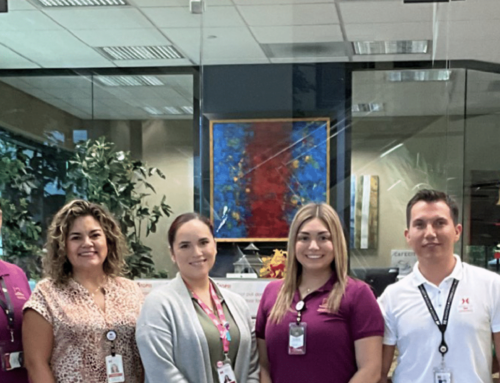Health Systems Leverage HIE Data in COVID-19 Response
Published on January 29, 2021

When a new patient arrived at a local HonorHealth emergency department (ED) in March, they told staff they had taken a COVID-19 test at a different hospital but still hadn’t received the results. The coronavirus pandemic in Arizona had just begun spreading across the Southwest.
“We needed to know those results because if that person was positive, we needed to get them isolated and away from any other patients and protect our staff,” explains Craig Norquist, MD, Chief Medical Information Officer for HonorHealth.
Fortunately, the patient had been at a nearby hospital that uses Epic, the same electronic health record (EHR) as HonorHealth, so the team was able to get the necessary information. But the incident illuminated a key opportunity during the COVID-19 pandemic — and led to a potentially lifesaving collaboration among local health systems and Contexture, Arizona’s health information exchange (HIE).
Collaboration & Action
HonorHealth had previously provided data to the HIE, but it was not incorporating data back into its own EHR, and the pandemic provided a clear opportunity to leverage shared data. The system wanted Contexture to direct positive and negative results to trigger alerts within its EHR to protect its front-line workers from exposure and minimize the need for repeat testing.
Luckily, this functionality already existed in Contexture thanks to a 2019 pilot project.
For that project, CommonSpirit Health (formerly known in Arizona as Dignity Health) sought to identify high ED utilizers who were visiting other hospital systems in the region. It put alert thresholds in place within Arizona’s HIE so that, for example, if a patient had six or more visits within 180 days, hospital staff would receive an ED high utilizer alert, allowing them to approach a patient’s care plan differently.
To deliver COVID-19 alerts, the ADT (admission, discharge, transfer) goes to Contexture — which determines if the patient already took a COVID-19 test — and then transmits the result(s) back to the hospital.
“It’s the same technology that was leveraged for the ED alerts, but it uses a different algorithm to determine if a COVID-19 test should be presented back to us,” says Ryan Sommers, System Director for HIE and Interoperability at CommonSpirit Health.
Real-Time Data & Results
Most providers and labs in Arizona publish results to Contexture. For Valleywise Health (formerly the Maricopa Integrated Health System), it was important to have recent COVID-19 test result data “ingested” into its EHR in near real time.
“I can’t overestimate the value of having the ability to get results in for those patients presenting in the ER or directly admitted,” says Anthony Dunnigan, MD, MBI, FAMIA, Vice President and Chief Medical Information Officer for Valleywise Health and a member of the Contexture Advisory Council. “It’s not just about saving test results. We’re able to put them in the right spot early on. It made a huge difference with what became extremely limited resources in late June and July.”
The value of this functionality stems from the alerts’ overt nature. The on-screen alerts from Contexture are strategically designed to immediately grab the provider’s attention.
“It’s more than, ‘Hey, watch out for this person,’” Dr. Norquist says. “It’s more of a ‘Hey, this person is positive, so you need to make sure you protect yourself and protect anyone who’s going to come in contact with them.’”
Working with the Arizona HIE, the systems have discovered how to enter external data as well. All of this together means potentially better outcomes for patients, too.
“You imagine a patient’s story — having that in your hands as you’re trying to care for these incredibly complicated people with comorbidities and medications,” Dr. Dunnigan says. “There’s value in having that full story to the extent you can. It has never been more obvious than when we have a fairly dire situation with these ultra-complicated patients and are having to make decisions about resources pretty quickly.”
Despite the many HIEs that CommonSpirit participates in, Contexture is the only one with this COVID-19 alert capability.
“Sometimes it takes unfortunate events or unfortunate scenarios to drive innovation,” Sommers says. “It was amazing to me how quickly we mobilized as a group to bring this together and put ideas on the table.”
Moving forward through the COVID-19 pandemic and keeping front-line healthcare workers safe requires innovation, collaboration and interoperability.
“This,” Dr. Norquist adds, “is a really great example of why we should be participating in the HIE.”
##
Editor’s note: This HIE Success Story is based on the panel discussion “HIE Use Cases & Success Stories: Hospital Perspectives,” delivered at ACHIEVE 2020, the 13th Annual Virtual Contexture Summit & Trade Show, held October 13-14, 2020.
HIE Participant organizations represented:
- Craig Norquist, MD, Chief Medical Information Officer, HonorHealth
- Tony Dunnigan, MD, MBI, FAMIA, VP & Chief Medical Information Officer, Valleywise Health
- Ryan Sommers, System Director, HIE and Interoperability, CommonSpirit Health
Related links:
- Presentation link | https://www.youtube.com/watch?v=cRs9gbiaSoo
- Not a HIE participant? Contact the Contexture recruitment team to join. | HIE Onboarding – Arizona
NOTE: Participants featured in a Contexture Success Story are automatically nominated for HIT Award consideration at a future Summit & Trade Show.
I can't overestimate the value of having the ability to get results in for those patients presenting in the ER or directly admitted. It's not just about saving test results. We're able to put them in the right spot early on, and it's made a huge difference with what became extremely limited resources in late June and July.
- Anthony Dunnigan, MD, MBI, FAMIA, Vice President and Chief Medical Information Officer for Valleywise Health








